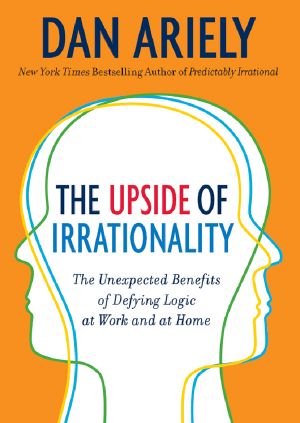Upside of Irrationality

- Authors
- Dan Ariely
- Publisher
- HarperCollins
- Tags
- general , psychology , decision-making & problem solving , education , self-help , personal growth
- ISBN
- 9780007354771
- Date
- 2010-11-15T05:00:00+00:00
- Size
- 1.07 MB
- Lang
- en
From Publishers Weekly
Ariely (_Predictably Irrational_) expands his research on behavioral economics
to offer a more positive and personal take on human irrationality's
implications for life, business, and public policy. After a youthful accident
left him badly scarred and facing grueling physical therapy, Ariely's
treatment required him to accept temporary pain for long-term benefit—a trade-
off so antithetical to normal human behavior that it sparked the author's
fascination with why we consistently fail to act in our own best interest. The
author, professor of behavioral economics at Duke, leads us through
experiments that reveals such idiosyncrasies as the IKEA effect (if you build
something, pride and sentimental attachment are likely to give you an inflated
sense of its quality) and the Baby Jessica effect (why we respond to one
person's suffering but not to the suffering of many). He concludes with
prescriptions for how to make real personal and societal changes, and what
behavioral patterns we must identify to improve how we love, live, work,
innovate, manage, and govern. Self-deprecating humor, an enthusiasm for human
eccentricities, and an affable and snappy style make this read an enriching
and eye-opening pleasure. (June)
Copyright © Reed Business Information, a division of Reed Elsevier Inc. All
rights reserved.
From
In Predictably Irrational (2008), Ariely explored the reasons why human beings
frequently put aside common sense and why bad things often happen when they
do. Here, in this equally entertaining and clever follow-up, Ariely shows us
the other side of the irrationality coin: the beneficial outcomes and pleasant
surprises that often arise from irrational behavior. Although pleasant should
be taken as a relative term, since the outcomes are not necessarily pleasant
for the person who was behaving irrationally. Take, for example, Thomas
Edison’s obsession with DC current, and his irrational hatred of AC: trying to
prove how dangerous AC was, he inadvertently—with his development of the
electric chair—demonstrated to the world how powerful it could be. Ariely is
an engaging and efficient writer, amusing us with stories about irrational
behavior while staying away from needless technical terminology and bafflegab.
Thought-provoking, entertaining, and smart: a winning combination. --David
Pitt